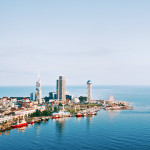Sophie Ibbotson discovers limitless vineyards in her wine lover’s guide to Kakheti.
Around 6,000 BC, at a time when prehistoric humans were still just getting to grips with forming simple tools from stone and bone, a farmer at Gadachrili Gora accidentally or otherwise turned her grape juice into wine. And as she and her neighbours liked the taste (and effect) of this new beverage so much, they repeated the process often enough that it caught on. 8,000 years later, we have these early Georgians to thank for inventing a product which has spread to almost every corner of the world and enjoyed by millions if not billions of people.
Gadachrili Gora is around 20 miles south of Tbilisi Georgia, and is regarded by archaeologists to be the birthplace of wine. In Georgia today, winemaking and wine drinking are celebrated national pastimes. As a wine loving tourist there are almost limitless vineyards to visit and wines to taste, but the epicentre of wine tourism is the region of Kakheti, hence, my wine lover’s guide to Kakheti, just a couple of hours east of the capital.


The first thing you will learn about traditional Georgian winemaking is that it is labour intensive and there is no fixed recipe. Twins Wine House in Napareuli is a good place to start this wine lover’s guide to Kakheti, as this winery has its own winemaking museum which describes the process in detail. Brothers Gia and Gela Gamtkitsulashvili will show you how they pick the grapes and then crush them underfoot without separating out the seeds, stalks, and the skin (the must). The extended maceration is important for the colour and distinctive flavour of the wine to develop.
Whereas European winemakers need additives to get rid of the resulting sediment, Georgians realised thousands of years ago that if you ferment wine in a qvevri (a terracotta vessel akin to an amphora, with a pointed bottom), the sediment naturally sinks. Burying the qvevri in the ground has the added benefit that the wine’s temperature remains much more constant throughout the fermentation process, significantly improving the quality.

Throughout much of Georgia’s history, the country’s monasteries were the major landowners and keepers of winemaking expertise. After all, the monks couldn’t risk running out of sacramental wine! The monks made their own wines, but Christians who lived locally would also donate a proportion of the wine they had made to the church, along with financial donations. It was, in essence, a tithe. As the country was frequently under attack from invaders, mostly from what are now Azerbaijan, Iran, and Turkey, some churches even fortified their wine cellars to keep their precious wines safe. You can see such examples in my wine lover’s guide to Kakheti.

Two of the finest surviving monasteries in Kakheti are Alaverdi and Ikalto, both magnificent buildings with rich histories. The monks at Ikalto were famed for their knowledge of viticulture and the detailed records they kept of the best pairings of indigenous grape varieties and terroir. Tragically, much of this inherited knowledge (and the manuscripts in which it was written) was lost in the Communist period when the monks were killed or sent to the gulags and the treasures of their monasteries stolen or destroyed.
It is only now, three decades after Georgia regained its independence, that passionate wine makers with an investigative streak can piece together some of this lost expertise and apply it in their own vineyards and cellars. Eko Glonti of Lagvinari, an anaesthetist turned geologist and winemaker, has been having particular success.
Unlike France, Georgia doesn’t have opulent chateaux, but there are still a few impressive country estates which belonged historically to the aristocracy. Of course, they had extensive vineyards and well-stocked cellars, too. The most significant of these in Kakheti is the Tsinandali Estate, the former home of Garsevan Chavchavadze, Georgia’s Ambassador to Russia; and, later, his son, Alexander.


The main house, which is now a museum, dates from 1886, and Alexander Chavchavadze transformed it into a cultural magnet for the most celebrated writers and poets of the day. Alexander Dumas, Alexander Pushkin, and Mikhail Lermontov were all guests here, and no doubt would have enjoyed the estate’s wines.
Alexander Chavchavadze was a pioneer in winemaking. In fact, he is credited with being the first Georgian winemaker to introduce “modern” European winemaking techniques and to bottle Georgian wine. His collection of more than 16,500 wine bottles is preserved in the enoteca at the museum. The oldest wine there dates from the 1839 harvest and was bottled two years later. It is too precious to open and drink, sadly, but there are plenty of other excellent wines on the wine list at Tsinandali’s atmospheric restaurants and the Gaumarjos Wine Bar.
Today’s owners of the Tsinandali Estate are rightly proud of their winemaking legacy, but they are also investing in the estate’s reputation as the foremost classical music venue in Georgia. Beside the historic house and luxury hotel they have constructed an open air amphitheatre for concerts, plus multiple smaller spaces suitable for chamber music.

Earlier this year, the Berlin Philharmonic chose to host their prestigious annual Europakonzert at Tsinandali. The world-famous orchestra’s soloist at that performance, Georgian violinist Lisa Batiashvili, will be returning to the estate for the annual Tsinandali Festival later this summer. Artists such as Joshua Bell, Bruce Liu, and Martin Fröst are also included in this year’s festival line-up, and there can be fewer places on Earth more glorious than Tsinandali to listen to classical music and drink fine wines. A fitting finale to my wine lover’s guide to Kakheti.
Images (C) Sophie Ibbotson
Tell me more about this wine lover’s guide to Kakheti.
Travel from London to Tbilisi via Pegasus Airlines via Istanbul, from £114 each way.
Rooms at Tsinandali Estate, A Radisson Collection Hotel, start from £167.
Tickets for the annual Tsinandali Festival are available from https://tsinandalifestival.ge/






